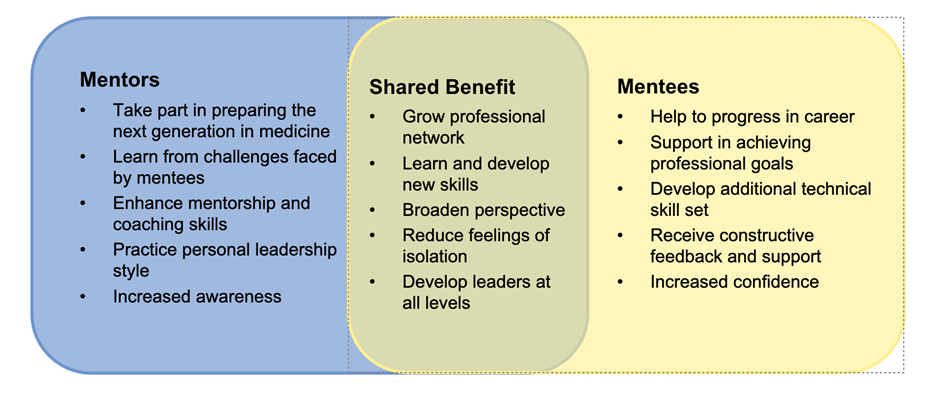The Personalities of a Mentor: Strengths, Strategies, and Potential Pitfalls
Jacqueline Hannan, PhD, Dario Winterton, MD
Published April 18, 2025 | Clinics in Medical Education
Issue 6 | Volume 1 | April 2025
Mentorship is a powerful relationship that offers the opportunity for transferring knowledge, guiding personal and professional growth, developing skills and confidence, offering constructive feedback, and cultivating a sense of belonging within a group. A sincere mentoring relationship can provide a variety of benefits for both a mentor and a mentee, while also contributing to positive culture within an organization.
Effective mentors play different roles depending on their strengths, personalities, and the unique needs of their mentees. Understanding different mentoring personalities helps mentors tailor their approach, ensuring they provide the right balance of challenge, support, and guidance. Combining a variety of approaches allows a mentor to uniquely support each mentee in a way that feels authentic and natural. The following examples of a few mentoring personalities highlight the diverse ways mentors can positively impact their mentees, each with distinct strengths, strategies, and potential shortcomings.

Figure 1
The Cheerleader: The Cheerleader provides consistent encouragement and emotional support, helping mentees build confidence and self-belief. They are quick to celebrate successes and offer positive reinforcement during setbacks. Strategies include encouraging perseverance in the face of challenges, highlighting progress, and reminding individuals of their strength. While their positivity is motivating, cheerleaders need to be mindful of creating unrealistic expectations and avoid indirectly stifling growth by making mentees too comfortable. The goal is to empower mentees to seek continual success, not just to feel good.
The Ideator: The Ideator encourages creativity and innovative thinking by showing mentees how to explore new possibilities. They serve as a thought partner and help reframe perspectives to solve problems and focus on the bigger picture. Successful strategies include encouraging open-ended questions, facilitating brainstorming sessions, and helping mentees to embrace failure as a part of the learning process. However, ideators can overwhelm mentees with too many ideas or struggle to follow through on execution. To be effective, they need to balance creativity with a focus on practical application.
The Connector: The Connector helps mentees build networks and find valuable opportunities by leveraging their connections and knowledge of resources. They introduce mentees to their contacts, guide them toward new experiences, and help them navigate complex systems. Potential pitfalls include focusing too much on connections over personal development or encouraging mentees to rely too heavily on others rather than developing confidence and independent thought. This mentoring personality requires a balance of relationship-building and empowerment for personal growth.
The Challenger: The Challenger pushes mentees to step outside of their comfort zone and face difficult circumstances by setting high standards and encouraging resilience. They believe in the mentees’ potential and offer direct feedback, helping mentees grow through discomfort and challenge. Effective strategies include setting ambitious but achievable goals, offering honest feedback, and asking thought-provoking questions. However, challengers must be careful not to become overly harsh or critical, which could discourage mentees or overlook their emotional needs. The key is balancing challenge with encouragement and support.

Figure 2
AI Generated Image: Mr. Miyagi from The Karate Kid – an example of a Challenger mentor personality.
The Advocate: The Advocate actively supports their mentee’s goals, often helping them gain recognition and access to opportunities. They speak up on their mentee’s behalf, ensure they are fairly treated, and help them navigate complex systems. Advocates can support mentees by helping them develop self-advocacy skills, recognizing their strengths, and encouraging them to build visibility. A potential pitfall of this approach is becoming overly protective or fighting battles for their mentees instead of empowering them to advocate for themselves.
Conclusion – The Multi-faceted Mentor: In many cases, a mentor may leverage different aspects of multiple mentoring personalities to create their unique approach to supporting mentees. Serving as a multi-faceted mentor is a skill that takes time to develop and requires an innate sense of how to adjust the strategy for guidance. Ultimately, the best mentors are those who find a balance of support and challenge to encourage growth, helping mentees to achieve their greatest potential.
